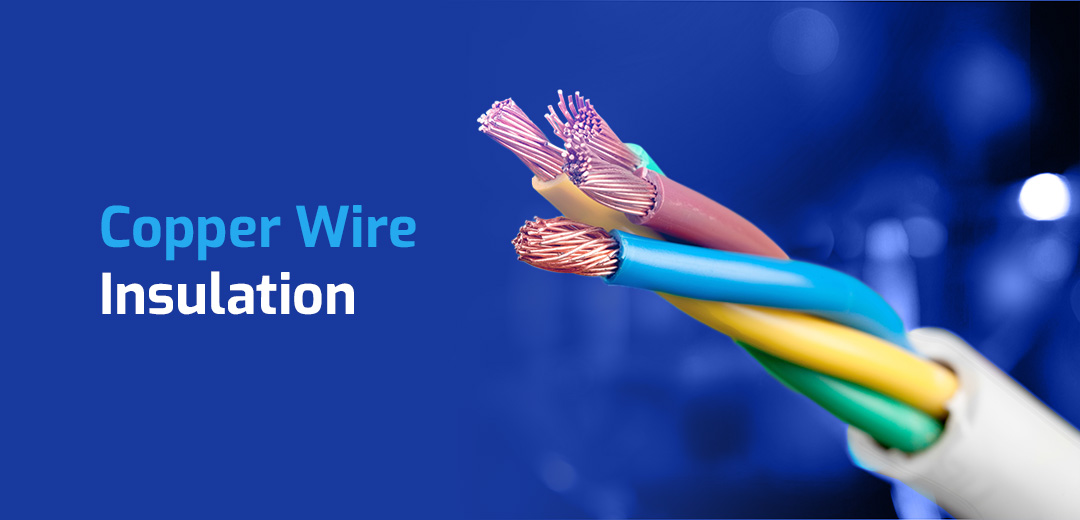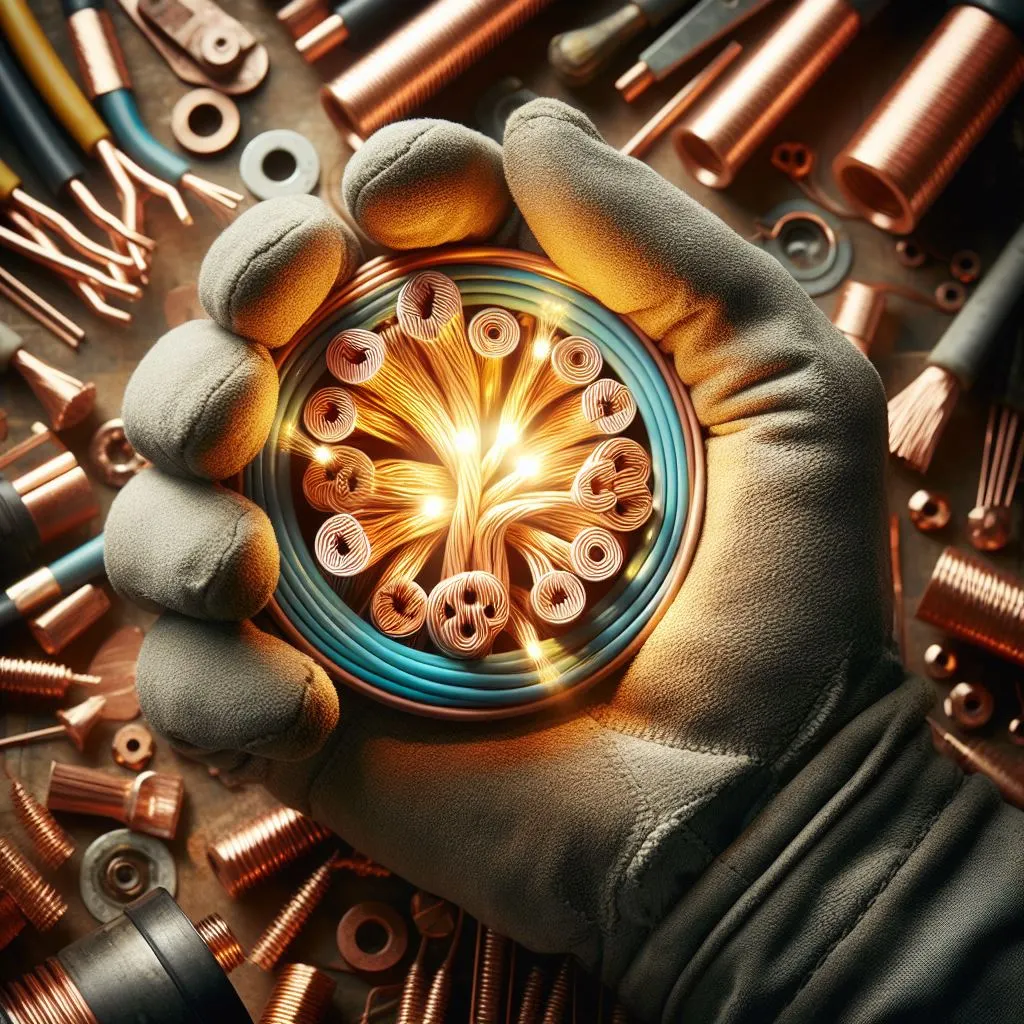The Insulating Material on Electrical Wires Can Be Copper: Copper wires are coated with an insulating material, with polyvinyl chloride (PVC) being the most commonly used insulator, safeguarding against electric shocks and ensuring safer use in electrical applications. PVC’s excellent electrical insulating properties make it an ideal material for cable insulation and sheathing.
Additionally, graphite, known for its conductivity, and varnish coating has been historically used for insulating wires. Modern methods mainly employ PVC due to its non-conductive properties, offering safety in home appliances and other electrical devices.
Over time, insulating materials for copper wires have evolved, with PVC emerging as the most widely utilized choice for its durability and effectiveness in electrical wire insulation.

Credit: www.amazon.com
Commonly Used Insulating Materials
When it comes to insulating electrical wires, various materials are commonly used to prevent electric shocks and ensure safety.
Pvc (polyvinyl Chloride)
PVC is a popular insulating material known for its excellent electrical properties and dielectric constant. It is widely used in cable insulation sheathing to protect against electric shocks.
Varnish Coating
Varnish coating is another common insulating material that is applied to wires to prevent the flow of electric current. It is often used in smaller electromechanical devices like voice coils and electromagnets.
Cotton Thread
In the past, cotton thread was commonly used to insulate wires, especially in home wiring applications. Woven around copper wires, this method was known as Double Cotton Covered (DCC) wire.
Graphite
Graphite, an allotrope of carbon, is a good conductor of electricity and heat. It is often used in electrodes, batteries, and solar applications due to its strong conductivity properties.

Credit: www.ebay.com
Properties Of Insulating Materials
Insulating materials are crucial for electrical wires, with copper often being coated with materials such as PVC to prevent electric shocks. PVC, abbreviated as polyvinyl chloride, offers excellent electrical insulation, making it ideal for electrical applications. Other common insulating materials include cotton thread, varnish coating, and vinyl polymer plastics.
Properties of Insulating Materials
Electrical Insulating Properties
The insulating material on electrical wires, such as copper, is essential for preventing electric shocks and facilitating the safe transmission of electricity. Insulators are materials that do not allow the flow of electric current, making them ideal for coating electrical wires. One commonly used insulating material is PVC (polyvinyl chloride), which has excellent electrical insulating properties.
PVC is an ideal choice for electrical applications due to its ability to resist the flow of electric current. This property ensures that the electricity is contained within the wire and does not leak out, reducing the risk of electrical accidents. Additionally, PVC has low conductivity, meaning it does not easily conduct or transfer electricity, further enhancing its insulating properties and safety.
Dielectric Constant
The dielectric constant, also known as relative permittivity, is a property of insulating materials that measures how effectively they store electrical energy when an electric field is applied. It indicates the material’s ability to withstand and insulate against electrical charges. PVC has a relatively high dielectric constant, making it an excellent insulating material for electrical wires.
With a high dielectric constant, PVC can store significant amounts of electrical energy and effectively insulate the wire from external electrical fields. This property ensures stable and reliable transmission of electricity without any interference or loss of energy due to external factors.
Conductivity
Despite being an insulating material, it is essential to consider the conductivity of the insulator itself. Conductivity refers to the ability of a material to conduct or transmit electricity. While PVC is primarily recognized for its insulating properties, it still possesses a certain level of conductivity.
The conductivity of PVC is relatively low compared to metals like copper. This property ensures that the insulating material does not interfere with the flow of electricity.
By having a lower conductivity than the metal conductor, PVC helps maintain the integrity and efficiency of the electrical circuit by preventing any leakage or unwanted diversion of electrical current.
Applications Of Copper Wires
Copper wires are widely used in various electrical applications due to their excellent conductivity and durability. The insulating material on electrical wires can be copper, which enhances their safety and performance. Let’s explore the diverse applications of copper wires in different electrical setups.
House Wiring
Copper wires are extensively utilized for house wiring due to their high electrical conductivity, flexibility, and heat resistance. The insulation material on these wires ensures safe electrical connections within residential buildings.
Electromagnetic Devices
Copper wires play a crucial role in the functioning of various electromagnetic devices. The insulation material protects the wires from damage and ensures stable electrical flow, making them ideal for applications in motors, transformers, and generators.
Home Appliances
Copper wires with insulating material are commonly employed in diverse home appliances such as refrigerators, air conditioners, and washing machines. The insulation safeguards the wires, enabling efficient and reliable performance of the appliances.
Safety Measures
Copper wires used for electrical purposes are coated with an insulating material, most commonly PVC (Polyvinyl chloride). PVC is chosen for its excellent electrical qualities, providing insulation and preventing electric shocks. It is a non-conductive material, making it safe for use in various electrical applications.
Importance Of Proper Insulation
Proper insulation of electrical wires is crucial in ensuring the safety of electrical systems and preventing potential hazards. The insulating material, often made of copper, plays a significant role in maintaining the integrity of the electrical wiring and preventing electrical mishaps.
Prevention Of Electric Shocks
One of the primary safety measures associated with electrical wiring is the prevention of electric shocks. Effective insulation of electrical wires, typically using copper as the insulating material, helps create a protective barrier that reduces the risk of electric shocks due to accidental contact with live wires.
It is important to understand that using appropriate insulation materials is necessary to avoid electrical mishaps. Proper insulation not only protects individuals from electric shocks but also ensures the smooth and safe functioning of electrical systems.
Comparison Of Insulator Materials
The insulating material on electrical wires such as copper can be diverse, including PVC (polyvinyl chloride) as a commonly used insulator. PVC effectively prevents electric current flow, making it ideal for electrical applications like cable insulation sheathing.
Other materials like graphite and varnish have also been historically employed for insulating wires. Insulating materials are crucial components of electrical wires, as they protect against electrical shocks and prevent the flow of current.
When it comes to insulating materials, there are various options available, each with its own unique advantages and disadvantages. In this section, we will compare two common insulator materials used on electrical wires: flexible PVC and hard PVC.
Flexible Pvc Vs. Hard Pvc
Flexible PVC:
- Advantages:
- Excellent flexibility, making it suitable for bending and twisting wires without causing damage.
- Good resistance to impact, abrasion, and chemicals, ensuring durability.
- High dielectric strength, providing reliable insulation to prevent electrical leakage.
- Disadvantages:
- Lower temperature resistance compared to hard PVC, limiting its application in high-temperature environments.
- Less resistant to UV radiation, which can cause degradation over time when exposed to sunlight.
Hard PVC:
- Advantages:
- Superior temperature resistance, allowing it to be used in high-temperature applications without losing its insulation properties.
- Better resistance to UV radiation, making it suitable for outdoor installations.
- Good mechanical strength, ensuring resistance to impact and external forces.
- Disadvantages:
- Less flexibility compared to flexible PVC, making it less suitable for installations requiring bending or twisting.
- Lower dielectric strength compared to flexible PVC, may affect its insulation capabilities.
It is important to carefully consider the specific requirements of your electrical wire installations when choosing between flexible PVC and hard PVC as insulating materials.
Factors such as environmental conditions, temperature range, flexibility needs, and UV exposure should be taken into account to ensure the optimal performance and longevity of your electrical wiring system.
Historical Perspective
The insulating material on electrical wires, specifically copper wires, has seen significant developments throughout history.
Evolution Of Insulating Materials For Copper Wires
In the early days, copper wires were insulated using primitive materials like cotton thread and varnish coatings. These materials offered basic protection against electrical shocks and short circuits.
Technological Advances In Insulation
With advancements in technology, polyvinyl chloride (PVC) emerged as a game-changer in the insulation industry. PVC became the preferred insulating material due to its exceptional insulating properties and durability.
Future Of Insulating Copper Wires
Copper wires are widely used in electrical applications due to their excellent conductivity. The insulating material on these wires plays a crucial role in ensuring safety and efficiency.
Looking ahead, the future of insulating copper wires holds exciting innovations and sustainability aspects that aim to enhance performance and reduce environmental impact.
Innovations In Insulating Materials
Continuous advancements in insulating materials are revolutionizing the way copper wires are used in electrical systems. New coatings and compounds are being developed to enhance insulation properties and durability, improving the overall performance of copper wires in various applications.
Sustainability Aspects
With an increasing focus on sustainability, the future of insulating copper wires also involves eco-friendly solutions. Manufacturers are exploring renewable and recyclable materials for insulating copper wires, reducing waste and environmental footprint in the production process.

Credit: wesbellwireandcable.com
Frequently Asked Questions About The Insulating Material On Electrical Wires Can Be Copper
Can Copper Be Used To Insulate Electrical Wires?
Copper cannot be used to insulate electrical wires. An insulating material like PVC is typically used.
What Is The Insulating Material On Electrical Wires Can Be?
The insulating material on electrical wires can be PVC (polyvinyl chloride). It is chosen for its non-conductive properties, ensuring safe use in home appliances and devices. Other insulating materials used in the past include cotton thread, varnish coating, and vinyl polymer plastics.
Is Copper Wire Insulated Wire?
Yes, copper wire is insulated with an insulating material such as PVC to prevent electric shocks.
What Material Is Used To Insulate Copper Wire?
The insulating material used on copper wires is PVC (polyvinyl chloride) to prevent electrical shocks. It provides excellent electrical insulation properties.
What Is The Insulating Material Used On Electrical Wires?
Answer: The insulating material typically used is PVC, ensuring electrical safety.
Conclusion
To protect against electric shocks and ensure safe electrical applications, the insulating material on electrical wires is often made of copper. This durable and reliable material acts as a barrier, preventing the flow of electric current and safeguarding both humans and electrical equipment.
Copper is a popular choice for wire insulation due to its excellent electrical insulating properties and dielectric constant. It provides an effective solution for cable insulation sheathing and plays a crucial role in maintaining electrical safety.


